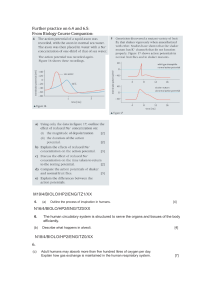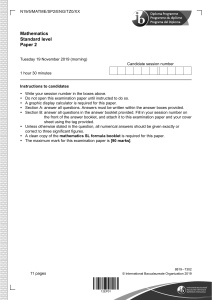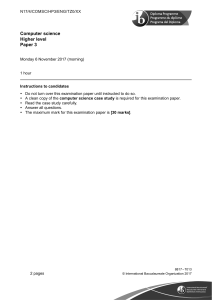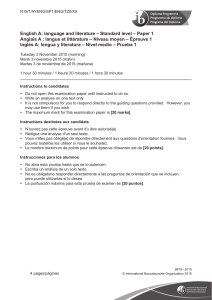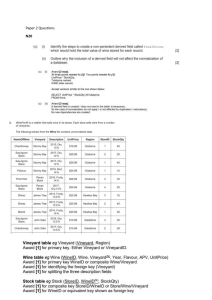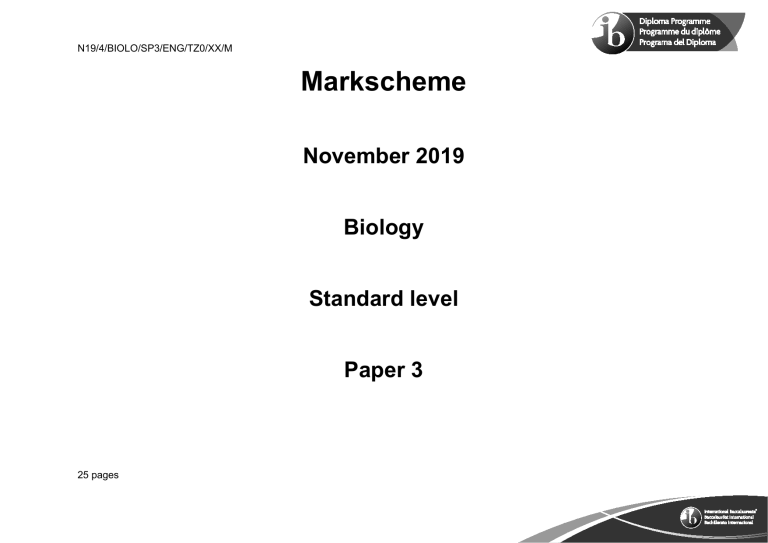
N19/4/BIOLO/SP3/ENG/TZ0/XX/M Markscheme November 2019 Biology Standard level Paper 3 25 pages –2– N19/4/BIOLO/SP3/ENG/TZ0/XX/M No part of this product may be reproduced in any form or by any electronic or mechanical means, including information storage and retrieval systems, without written permission from the IB. Additionally, the license tied with this product prohibits commercial use of any selected files or extracts from this product. Use by third parties, including but not limited to publishers, private teachers, tutoring or study services, preparatory schools, vendors operating curriculum mapping services or teacher resource digital platforms and app developers, is not permitted and is subject to the IB’s prior written consent via a license. More information on how to request a license can be obtained from http:// www.ibo.org/contact-the-ib/media-inquiries/for-publishers/guidance-for-third-party-publishers-and-providers/how-to-apply-for-alicense. Aucune partie de ce produit ne peut être reproduite sous quelque forme ni par quelque moyen que ce soit, électronique ou mécanique, y compris des systèmes de stockage et de récupération d’informations, sans l’autorisation écrite de l’IB. De plus, la licence associée à ce produit interdit toute utilisation commerciale de tout fichier ou extrait sélectionné dans ce produit. L’utilisation par des tiers, y compris, sans toutefois s’y limiter, des éditeurs, des professeurs particuliers, des services de tutorat ou d’aide aux études, des établissements de préparation à l’enseignement supérieur, des fournisseurs de services de planification des programmes d’études, des gestionnaires de plateformes pédagogiques en ligne, et des développeurs d’applications, n’est pas autorisée et est soumise au consentement écrit préalable de l’IB par l’intermédiaire d’une licence. Pour plus d’informations sur la procédure à suivre pour demander une licence, rendez-vous à l’adresse http://www.ibo.org/fr/contactthe-ib/media-inquiries/for-publishers/guidance-for-third-party-publishers-and-providers/how-to-apply-for-a-license. No se podrá reproducir ninguna parte de este producto de ninguna forma ni por ningún medio electrónico o mecánico, incluidos los sistemas de almacenamiento y recuperación de información, sin que medie la autorización escrita del IB. Además, la licencia vinculada a este producto prohíbe el uso con fines comerciales de todo archivo o fragmento seleccionado de este producto. El uso por parte de terceros —lo que incluye, a título enunciativo, editoriales, profesores particulares, servicios de apoyo académico o ayuda para el estudio, colegios preparatorios, desarrolladores de aplicaciones y entidades que presten servicios de planificación curricular u ofrezcan recursos para docentes mediante plataformas digitales— no está permitido y estará sujeto al otorgamiento previo de una licencia escrita por parte del IB. En este enlace encontrará más información sobre cómo solicitar una licencia: http://www.ibo.org/es/contact-the-ib/media-inquiries/for-publishers/guidance-forthird-party-publishers-and-providers/how-to-apply-for-a-license. –3– N19/4/BIOLO/SP3/ENG/TZ0/XX/M Section A Question 1. a b Marking point a b Answers Notes Total carrot: 0.50 mol dm–3 ✔ Allow a range of 0.22–0.32 Allow a range of 0.45–0.55 (Allow 1 max if no units or either unit is omitted) 2 different dissolved solutes/sugars/sucrose/salts/molarities ✔ Do not accept starch. potato: 0.26 mol dm–3 ✔ OR may have been grown in different soils giving their tissues different contents ✔ OR may have been stored under different conditions ✔ OR may be more dehydrated / different water content ✔ 1 max OR different types of tissue / different age ✔ (continued...) –4– N19/4/BIOLO/SP3/ENG/TZ0/XX/M (Question 1 continued) c d a the data show clear trends OR a trend line could be drawn through these data OR there are no outliers ✔ b the error bars/standard deviations shown OR the error bars/standard deviations vary with concentration ✔ c sample size is unknown ✔ a the change in mass indicates whether the tissue has gained/lost water ✔ b the pieces of tissue will not be the same mass «at the beginning of the experiment» ✔ c to compare the relative changes in mass ✔ 2 max 2 max –5– 2. a b N19/4/BIOLO/SP3/ENG/TZ0/XX/M temperature OR lactose/substrate concentration OR Inhibitors / cofactors ✔ Do not accept pH or acidity. a test samples for the concentration/amount of products/glucose/fructose/substrate/lactose ✔ Accept use Benedict/Fehling to see change in amount of reducing sugar b take samples of the reaction mixture at regular/timed intervals ✔ Must indicate that samples are taken at timed intervals c repeated measurements «at the different pH values» ✔ d measure independent/controlled/standardised/variables / temperature ✔ 1 max 2 max –6– 3. a a small drops applied OR use fine needle/pipette ✔ b several drops applied «to get strongly coloured spot» ✔ c each drop must be dry before the next is applied ✔ d drops applied to the origin/baseline/bottom line/just above the level of the solvent ✔ End is too vague TLC develops faster OR clearer separation/colours/bands/spots «on a TLC» OR easier to calculate the Rf values OR shorter chromatograms can be used OR TLC uses less solvent ✔ Clearer alone is not enough for the mark, candidates must state what is clearer b c N19/4/BIOLO/SP3/ENG/TZ0/XX/M a leaves are green because they contain chlorophyll ✔ b chlorophylls/leaves reflect green light / absorb blue/red light ✔ c other pigments masked/hidden by chlorophylls ✔ Need idea of ‘small’ 2 max 1 max 2 max –7– N19/4/BIOLO/SP3/ENG/TZ0/XX/M Section B Option A — Neurobiology and behaviour Question 4. Marking point Answers Notes Total a neurulation ✔ 1 b neural plate OR neural groove OR ectoderm ✔ 1 spina bifida ✔ c d a neurons differentiate from neural tube / stem cells ✔ b axons/dendrites grow ✔ c «axon growth is» directed by chemicals/growth substances ✔ d neurons migrate ✔ e synapses form ✔ Accept a description of spina bifida 1 2 max –8– 5. a b a I: skull bone/cranium ✔ b II: «left cerebral» hemisphere OR III «right cerebral» hemisphere ✔ less white matter OR bigger space in the middle/ventricles OR overall area/volume of cortex/cerebrum is reduced/space between cortex/cerebrum and cranium bigger/number of folds is reduced OR slower nerve transmission OR fewer synapses OR function of cerebral hemispheres diminished ✔ N19/4/BIOLO/SP3/ENG/TZ0/XX/M 2 max 1 max (continued...) –9– N19/4/BIOLO/SP3/ENG/TZ0/XX/M (Question 5 continued) c a the cerebral hemispheres are responsible for higher order functions ✔ b the folding permits an increased surface area without increasing the cranium size OR permits high surface area to volume ratio ✔ c increased surface/volume permits more synapses ✔ d humans have a highly developed/highly folded cerebral cortex ✔ e folding decreases distances therefore faster communication ✔ 3 max – 10 – 6. a N19/4/BIOLO/SP3/ENG/TZ0/XX/M Accept any arrow pointing upwards 1 [Source: reprinted by permission from Springer Nature: Nature Reviews Neuroscience Parallel processing in the mammalian retina, Heinz Wässle, 2004, Nat Rev Neurosci 5, 747–757 (2004) doi:10.1038/nrn1497] b A: bipolar cell B: ganglion cell ✔ Both required 1 (continued...) – 11 – N19/4/BIOLO/SP3/ENG/TZ0/XX/M (Question 6 continued) c Accept any of these points made on an annotated diagram. a right eye receives information/stimuli/light from both «left and right» visual field ✔ b light from the left visual field goes to the right side of the retina OR vice versa ✔ c impulses «from retina» carried along the optic nerve ✔ d «optic» nerves cross at «optic» chiasma ✔ e impulses from the left side of the retina goes to the left side of the brain OR vice versa ✔ 3 max – 12 – 7. a vibrations transmitted by the oval window «to the inner ear» ✔ b sound waves cause vibrations/waves in cochlear fluid ✔ c sensory hairs ‹attached to the basement membrane› are moved by the waves in the fluid ✔ d each frequency stimulates a specific groups of hair cells ✔ e higher frequencies detected closer to the base of the cochlea OR vice versa ✔ f impulses transmitted by the auditory nerve to the brain ✔ N19/4/BIOLO/SP3/ENG/TZ0/XX/M 4 max – 13 – Section B Option B — Biotechnology and bioinformatics Question 8. a b Marking point N19/4/BIOLO/SP3/ENG/TZ0/XX/M Answers Notes blackwater OR brownwater/sewage OR feces OR organic solid waste OR paper pulp OR other biodegradable material ✔ Do not accept methane and CO2. temperature warm and oxygen concentration low / anaerobic ✔ Accept above room temperature / 20 to 70oC for warm, depending on bacteria used. Both required Total 1 1 (continued...) – 14 – N19/4/BIOLO/SP3/ENG/TZ0/XX/M (Question 8 continued) c a in batch culture product is withdrawn at the end of the «organisms» growth phases whereas in continuous culture product is withdrawn while the organism is growing / OWTTE ✔ b in batch culture all of the growth medium/nutrients are added at the beginning whereas in continuous culture, growth medium/nutrients are added at a constant rate / OWTTE ✔ c batch culture is carried out in large scale fermenters whereas continuous culture could be in small scale ✔ d continuous can run for a longer time than batch ✔ 2 max – 15 – 9. a 10. transfer of resistance genes to non-transgenic/organic crops OR transfer of resistance genes to wild relatives/development of weed resistance ✔ b separate fields by at least 5m because at this distance no cross pollination occurs✔ c «Gram» negative✔ d a b N19/4/BIOLO/SP3/ENG/TZ0/XX/M a genes to be transferred are introduced into a tumour-inducing/Ti plasmid/vector ✔ b ‹embryo, seedling leaf› tissue is damaged/wounded / callus formed ✔ c A. tumefaciens recognizes/is chemically attracted to damaged/wounded tissue ✔ d A. tumefaciens transfers tumour-inducing/Ti plasmid/vector into plant cell ✔ e plasmid integrates into plant cell genome ✔ 1 max Needs a reason 1 max 1 3 max AAT and ATG and TGC OR ATG and TGC and GCG ✔ All three triplets required. a significant length of DNA that begins with a start codon and ends with a stop codon ✔ Significant length or similar phrase required 1 1 – 16 – 11. a a both cause pressure to drop ✔ b pressure always higher in both compared to control ✔ c nanofiltration causes least drop in pressure OR ultrafiltration causes the most drop in pressure ✔ d the drop in pressure for ultrafiltration is more irregular than for nanofiltration ✔ b c using bacteriophages/viruses OR adding biocides/bactericides/chlorine OR using cell dispersal agents ✔ a biofilms are composed of different species of bacteria/communities of microbes ✔ b ‹biofilms› form an extracellular film/slime/EPS/exopolipeptide/exopolysaccharides ✔ c microbes of biofilms show coordination/cooperation/quorum sensing ✔ d individual microbes have a greater chance of survival in the biofilm «than on their own» ✔ e biofilms have antibiotic resistance ✔ f there are exchanges of nutrients between the microbes which is not possible for individual cells ✔ N19/4/BIOLO/SP3/ENG/TZ0/XX/M 3 max 1 4 max – 17 – Section B Option C — Ecology and conservation Question 12. a b Marking point N19/4/BIOLO/SP3/ENG/TZ0/XX/M Answers a as light level changes so does the percentage cover «of blackberry» ✔ b distribution is higher at intermediate/moderate light intensities ✔ c little growth at low light intensities OR little growth at high light intensities ✔ d distribution is bell shaped ✔ only energy can be lost/gained/exchanged/transferred «with the exterior» OR only matter is constant/recycled ✔ Notes Accept appropriate numerical values Total 2 max Accept appropriate numerical values 1 (continued...) – 18 – N19/4/BIOLO/SP3/ENG/TZ0/XX/M (Question 12 continued) c Award [3 max] if only one side of the argument is given. a Advantages: can show the energy loss/transfer between trophic levels ✔ b permits a ‹quantitative› comparison between ecosystems ✔ c shows change over time ✔ d Disadvantages: are difficult to produce accurately ✔ e require destructive methods to obtain the data ✔ f do not show all the interactions/food chains/feeding relationships «between different members of the community» ✔ g cannot represent organisms that feed at different trophic levels ✔ 4 max – 19 – 13. a b a large effect on the ecosystem/community structure/environment«relative to abundance» OR influence the balance of other populations in the ecosystem OR other species in the habitat would also disappear OR many other species dependent on them for survival ✔ a both describe the habitat/role/relationship occupied by a species ✔ b the fundamental niche is the potential role of a species in its ecosystem and realized niche is the actual role OR the fundamental niche depends on the adaptations of a species whereas the realized niche is limited by competition/predation OR realized niche is ‹usually› smaller than fundamental niche ✔ N19/4/BIOLO/SP3/ENG/TZ0/XX/M 1 max 2 max – 20 – 14. a a radioisotopes entered the sea/found in the water «in Japan» ✔ b taken up by producers/phytoplankton/enter gills of fish ✔ c producers eaten by consumers/fish ✔ d «radioisotopes» are passed on up the food chain OR contaminated fish are eaten by tuna /other fish ✔ e radioisotopes are not easily excreted ✔ f at each level there is bioaccumulation/biomagnification ✔ b N19/4/BIOLO/SP3/ENG/TZ0/XX/M 3 max Award mp for species not group. a presence/absence indicate environmental conditions ✔ b changes in the environment affect these species ✔ c «relative» numbers of individuals/indicator species can be used to calculate a biotic index ✔ d changes monitored over time ✔ e changes can lead to measures to protect the environment ✔ f example of an indicator species AND what it indicates «e.g. Tubifex for sediment pollution» ✔ Number or type of species 3 max Example of time frame Award marks for a species, not a group. – 21 – 15. a changes/increases/decreases richness/biodiversity/evenness/the numbers of species ✔ b i name of species and where it is invasive e.g. introduction of cane toads in Australia ✔ ii a b ‹interspecific› competition with endemic/native species ✔ may cause the extinction/reduction of endemic/native species OR reduces biodiversity OR becomes invasive ✔ c does not have endemic / natural predators so may increase in numbers ✔ d upsets the balance between predators and prey OR disrupts food chains ✔ N19/4/BIOLO/SP3/ENG/TZ0/XX/M 1 max Accept common name of species but not general groups e.g. toads. 1 May be outlined using a specific example 2 max – 22 – N19/4/BIOLO/SP3/ENG/TZ0/XX/M Option D — Human physiology Question 16. a b c Marking point Answers a increasing the mass of almonds eaten increases the energy content of feces ✔ b some of the energy consumed in foods may not be absorbed/is lost/egested in feces ✔ c can’t draw conclusions as the data is incomplete ✔ a A calorimeter/calorimetry is used ✔ b food is burned/heated/combusted to release energy/heat ✔ c the energy/heat is used to heat up water ✔ d the rise in temperature of the water allows the energy in the food to be calculated ✔ e energy from the food = specific heat capacity of water x mass of water x temperature rise ✔ cellulose/lignin/fibre ✔ Notes Total 2 max 3 max Accept alternative correct formula 1 – 23 – 17. a i sight/smell of food OR negative/positive feedback OR nervous control/vagus/parasympathetic nerve stimulation OR hormonal control / gastrin / secretin / somatostatin ✔ 1 max exocrine✔ Do not accept name of specific digestive gland. 1 small intestine/duodenum/ileum/jejunum ✔ Villi alone not acceptable. Accept intestinal villi. 1 a microvilli increase the surface area for absorption ✔ Each adaptation needs function stated. Do not accept villi, microvilli is required. b many mitochondria produce ATP/energy «for active transport» ✔ c vesicles resulting from endocytosis ✔ ii b i ii N19/4/BIOLO/SP3/ENG/TZ0/XX/M 2 max – 24 – 18. a b a erythrocytes/red blood cells have a lifespan of approximately 120 days ✔ b erythrocytes/red blood cells taken in by phagocytosis ✔ c «phagocytosis» by Kupffer cells ✔ d hemoglobin splits into globin and heme groups ✔ e iron removed / recycled✔ f heme without iron becomes bile pigment/bilirubin ✔ g globin/protein digested/hydrolysed to amino acids ✔ Cause: Hepatitis / liver cancer / cirrhosis / parasite infection / excess production of bile pigments/bilirubin / blocked bile ducts / gall stones ✔ Consequence: yellowing/discoloration of skin/sclera/white of the eye / dark urine / grey feces / brain damage in infants ✔ N19/4/BIOLO/SP3/ENG/TZ0/XX/M 4 max Do not accept toxins or alcohol 2 – 25 – 19. N19/4/BIOLO/SP3/ENG/TZ0/XX/M a «heart sounds» produced by the closing of the valves ✔ . b first sound «lub» is due to «closure of» the atrioventricular valves ✔ Accept bicuspid/mitral and tricuspid. c second sound «dup» is due to «closure of» the semilunar valves ✔ Accept pulmonary/aortic valves. d sequence of sounds is lub dup ✔ OWTTE 3 max
